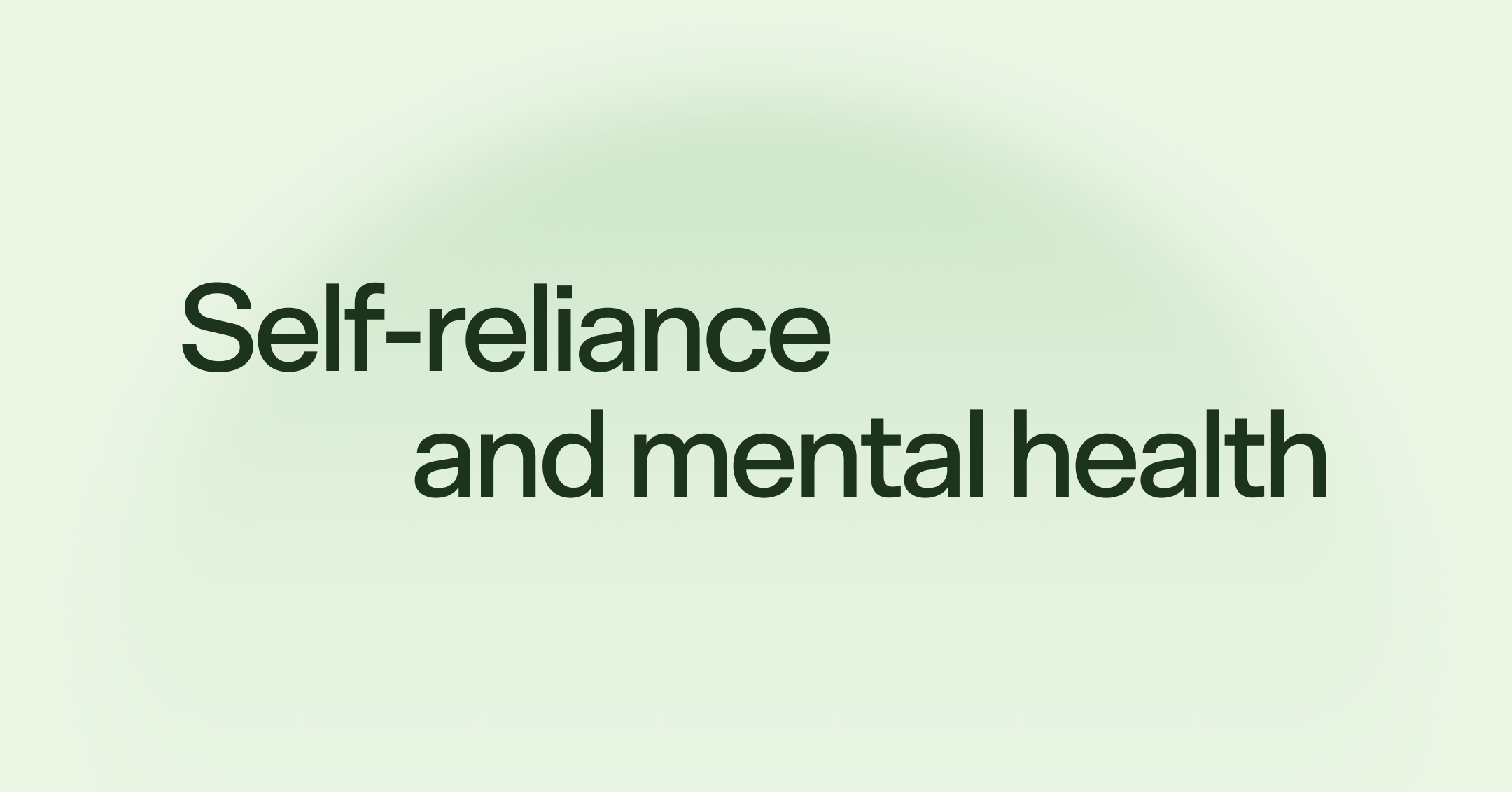Self-reliant people trust themselves to make decisions confidently and take responsibility for their well-being, without relying too much on others.
While self-reliance is a valuable trait, trying to handle everything alone all the time can lead to stress, exhaustion, and a sense of isolation.
Many strategies can increase your self-reliance, like setting healthy boundaries, identifying your goals, and working with a therapist.
We all know certain people who seem to have it together. They know when to handle things on their own and when to ask for help. That kind of balance helps them stay self-reliant while also protecting their mental health.
Self-reliance boosts confidence, builds resilience, and gives you a greater sense of control over your life.
If you’re working on becoming more self-reliant, therapy can be a supportive space to start trusting your ability to make decisions and solve problems — even when it feels uncomfortable. A therapist can help you build this important skill and grow through both your wins and challenges.
What having self-reliance means
Self-reliant people trust themselves to meet their own needs, make decisions, and solve problems independently.
Here are three examples for how self-reliance might show up in real-life situations:
Zoe is out of work and wants a steady job. Instead of waiting for someone to guide her, she begins researching in-demand careers and finds training programs that fit her goals, all on her own.
Liam is in a happy relationship, but he still makes time for his own hobbies and friends. When problems come up, he talks things through and takes responsibility for his feelings, without expecting his partner to fix everything for him. While he leans on his partner for support, he also remains true to himself.
After receiving a new project assignment, Violet takes the initiative to outline a plan, research what she needs, and solve problems as they come up, all without waiting to be told what to do. She checks in with her manager when needed, takes ownership of her work, and is confident in her decisions.
Self-reliance and mental health are closely connected because feeling capable of managing your life can boost your confidence, reduce anxiety, and increase resilience. When you’re self-reliant, you’re more likely to trust your judgment, handle stress in healthy ways, and feel a stronger sense of control — all of which support better well-being.
Types of self-reliance can include:
Emotional: The ability to comfort yourself during hard times, rather than depending on others to make you feel better
Financial: Managing your money, paying bills, and making responsible financial decisions without relying on others
Intellectual: Thinking critically, forming your own opinions, and making informed decisions without blindly following what others say
Physical: Taking care of your health and daily needs, like preparing meals, exercising, and attending appointments on your own
Social: Feeling comfortable being alone and not relying on others for a sense of identity, self-worth, or constant companionship
Practical: Handling everyday tasks and unexpected situations, like fixing things, cooking, or problem solving in the event of an emergency
Spiritual: Following your own beliefs and values, staying true to your inner compass, and not relying on others for moral guidance or spiritual validation
Can you be too self-reliant?
Self-reliance is an essential skill for navigating the world independently and with confidence. But when someone feels like they must handle everything on their own, they might avoid asking for help, even when it’s needed. This can lead to stress, burnout, and emotional isolation.
To find a healthy balance, start by practicing vulnerability. Allow yourself to ask for help even with small tasks and build trust in others by sharing your thoughts and needs gradually. Remember that it’s OK to ask for help when you need it.
Continually, you can begin to say ‘yes’ to people who offer help more often. A lot of the time, people want to feel helpful, like when they carry your groceries to the car or bring a dish to the party you’re hosting. Saying yes in these moments can take something off of your to-do list and can deepen relationships.
If you struggle with reaching out for help, feel like you must manage everything alone, or feel emotionally disconnected from those around you, therapy can offer a variety of benefits. A therapist can support you in identifying the underlying reasons for your resistance to asking for help, whether it’s perfectionistic tendencies, your attachment style, or an underlying mental health condition.
The care you need, when you need it
Learn how Rula can support your mental health journey
Subtle ways self-reliance enhances your life
When we think of self-reliance, we often picture big moments, but the real power of self-reliance often shows up in smaller everyday ways, including:
You stop overexplaining. You feel less pressure to justify your decisions or seek others’ approval.
You enjoy your own company. You find comfort, peace, and even joy in spending time alone.
You set clear boundaries. You know what you need and protect your time, energy, and values without guilt.
You trust your intuition. You make decisions with more confidence and less second-guessing.
You’re less anxious for approval. You care less about what others think and more about what feels right for you.
You bounce back faster. Setbacks feel less overwhelming because you believe in your ability to figure things out.
You feel more outgoing. Research shows that self-reliant people often feel less shy and relate themselves higher in physical attractiveness.
How to become more self-reliant
Self-reliance isn’t something we’re born with. It’s a skill we develop through experience and shifting our mindset. Becoming more self-reliant means learning to trust your own judgment, make independent decisions, and handle life’s challenges with greater confidence.
Some actionable ways to strengthen your self-reliance include:
Change your mindset. Cultivate a growth mindset by facing challenges head-on, being kind to yourself, and always learning. A growth mindset helps you stay motivated, build resilience, and navigate setbacks with more ease.
Improve decision-making skills. Practice making decisions on your own — even small ones — to build confidence. If indecision is an obstacle, cognitive behavioral therapy (CBT) can help you recognize and reframe negative thought patterns.
Identify your goals and priorities. Clarify what matters most to you: your values, passions, and the life you want to create. Then break those ideas into realistic goals. Prioritize what’s urgent and meaningful.
Set healthy boundaries. Being self-reliant means knowing when to say yes, when to say no, and when to ask for support without guilt. Healthy boundaries protect your energy while keeping your relationships fair and respectful.
Address codependency. If you’re codependent, becoming more self-reliant starts with noticing when you prioritize others over yourself and learning to make independent choices. Building self-trust, setting gentle boundaries, and learning to enjoy your own company are key steps toward more balanced relationships.
Recognize your attachment style. People with dismissive avoidant attachment style are often self-reliant but emotionally disconnected. True self-reliance isn’t about pushing people away. It’s about knowing you can rely on yourself while still connecting with others in a healthy way.
Work with a therapist. Therapy can also help you recognize any negative beliefs that might be preventing you from handling things on your own. A therapist can help you develop problem-solving skills and how to comfort yourself in difficult moments, rather than relying on someone else.
Emotional self-reliance is challenging for people to develop because it requires a deep sense of self-awareness, inner strength, and the ability to regulate emotions without over-relying on external validation. Therapy can help build internal trust while still embracing connection with others.

Ashley Ayala, LMFT
Clinical reviewer
Find care with Rula
Finding the right balance between self-reliance and relying on others isn’t always easy. Rely too much on yourself, and you might feel stressed and isolated. Depend too much on others, and your confidence can take a hit. A therapist can help you navigate this balance by teaching problem-solving skills and setting healthy boundaries, while reminding you to ask for help when you need it.
At Rula, we’re committed to delivering a comprehensive behavioral health experience that helps people feel seen and understood so they can get back to feeling their best.
Rula makes it easier to find a licensed therapist or psychiatric provider who accepts your insurance so you don’t have to choose between affordable care and excellent care. With a diverse network of more than 15,000 providers, 24/7 crisis support, and appointments available as soon as tomorrow, we’re here to help you make progress — wherever you are on your mental health journey.
Rula's editorial process
Rula's editorial team is on a mission to make science-backed mental health insights accessible and practical for every person seeking to better understand or improve mental wellness.
Members of Rula’s clinical leadership team and other expert providers contribute to all published content, offering guidance on themes and insights based on their firsthand experience in the field. Every piece of content is thoroughly reviewed by a clinician before publishing.




